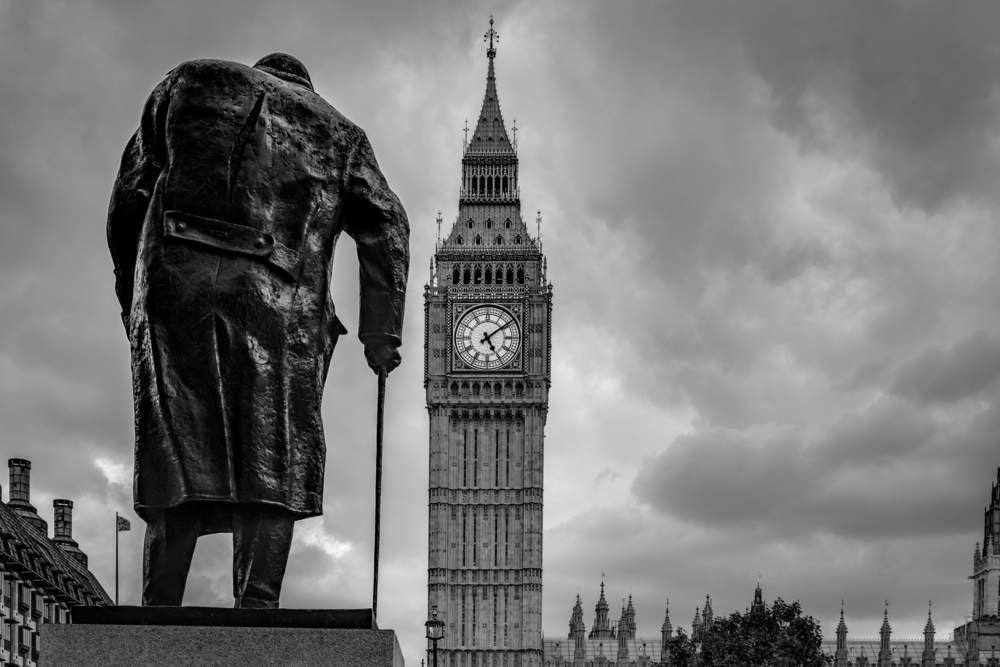
With the release of Darkest Hour and Gary Oldman’s Golden Globe award-winning performance in the role, there’s more interest than ever in the life of Winston Churchill. Regarded by some as the greatest British prime minister, Churchill’s efforts to rally British troops are widely considered to have helped the Allies win World War Two.
Churchill’s stout, formal silhouette is instantly recognisable to most Britons, as are some of the former prime minister’s personality quirks. Churchill is remembered as a witty man with a dry sense of humour. History also confers upon him a prickly personality, impatient and demanding.
Still, when one thinks of a leader, Churchill stands up as one of the most noteworthy in modern history.
1. A great orator will never be forgotten.
There are few qualities of Churchill’s that have gone down in history quite as much as his skill as an orator. His speeches have gone down in history as great inspirations to the British people in wartime. It’s important to note that Churchill was deeply unpopular within his own party at the beginning of his premiership. However, after his first “I have nothing to offer but blood, toil, tears, and sweat” speech, Robert Rhodes James, a historian and fellow member of parliament described fellow ministers ‘now listening, and cheering’.
And speaking like Churchill is a skill that anyone can learn. Churchill once wrote: . “Rhetorical power is neither wholly bestowed, nor wholly acquired, but cultivated.”
2. Have courage in your convictions.
Another of Churchill’s most famous qualities was his prescience. It was Churchill who first began campaigns for Britain to rearm against Germany in preparation against Hitler’s rise. He also campaigned fiercely against plans to appease Hitler or discuss peace terms before the war broke out. This is actually the initial dispute presented in Darkest Hour that led Churchill to being made prime minister.
How well do you really know your competitors?
Access the most comprehensive Company Profiles on the market, powered by GlobalData. Save hours of research. Gain competitive edge.

Thank you!
Your download email will arrive shortly
Not ready to buy yet? Download a free sample
We are confident about the unique quality of our Company Profiles. However, we want you to make the most beneficial decision for your business, so we offer a free sample that you can download by submitting the below form
By GlobalDataEven after the war, when he was replaced as prime minister, Churchill remained a leading force in the conservative party, despite those who thought he would step down. Later, he returned to premiership, proving it’s important not to throw the baby out with the bath water and one failure need not be the need of everything.
3. Dress simply – you have more important things to worry about.
“He used to wear a siren suit and we used to see this shortish, fattish, tubby man bouncing along in a siren suit,” claimed Margaret Walker, a typist and secretary of Churchill’s. He’s also noted to have worn a similar outfit when visiting the White House by staff members there.
A siren suit was an all-in-one suit, not dissimilar to a boiler suit that could be worn over other clothes. It was so named because they were often worn by those who had to flee their homes in the middle of air raids and didn’t have time to dress fully. Churchill obviously did have time to dress properly, but wore ‘siren suits’ anyway. Clearly, the message here is ‘why waste time dressing up when you could be working?’
4. Respect your staff.
Churchill does have a reputation as being quite hard-faced and difficult to get along with. He often played tricks on his staff and worked them very hard. They also had to put up with his unusual behaviour which included being naked when they brought brandy to him. However, his personal secretary Elizabeth Layton claims despite his personal quirks, staff got on with Churchill because he made them feel valued:
“We of his personal staff were completely devoted to him, even though he was inclined to be impatient and demanding. He was somebody who drew our loyalty and our deep respect and affection … The negative side was only on the surface. Underneath he was a very caring person.”
5. Be as comfortable as you can be while working.
Aside from just wearing his famous ‘siren suit’ Churchill had various other ways of staying comfortable at work. According to new documents revealed by the Imperial War Museum to mark the release of Darkest Hour Churchill often worked from his bed. A type-writer and secretary would be on hand if he needed to get important information out. He is also famous for taking very long, very hot baths which from which he would dictate notes to his secretaries who were out of the room.
6. Take care of your mental health.
Churchill is widely believed to have suffered from clinical depression. There are conflicting reports about the truth of the ‘Black Dog’ which supposedly plagued his life (and who actually invented that term) but he did suffer from ‘prolonged fits of depression’. However, he took great interest in psychology and was particularly intrigued by a relative who claimed to have been cured of the depression by a German psychiatrist.
However, Churchill also notably made great effort to battle his depression. He was known as a very emotional man who shed tears when appropriate. In recordings of some of his speeches, Churchill can clearly be seen holding back tears. Obviously he didn’t repress his emotions. In addition, Churchill admitted in his book Painting as a Pastime that his hobbies helped him get through his darkest moments.
7. There’s always time for hobbies even when you’re working hard.
As mentioned above, Churchill was a prolific painter of over 500 landscape paintings. These days his paintings are displayed all over the world. He was also a prolific writer of both books and newspaper columns, and won the Nobel Prize For Literature for his lifelong writing habit. In addition, Churchill was a keen amateur bricklayer, and also bred butterflies at his country home.
8. The establishment’s favourite choice isn’t always the best choice.
As Darkest Hour covers in some detail, Churchill wasn’t much liked by the Conservative party or the House Of Lords. The establishment choice was Edward Wood, Earl Of Halifax. One of those men has been almost entirely forgotten to history while the other frequently tops lists of the greatest leaders of all time. It just goes to show that sometimes the wildcard choice is the right one and the establishment candidate isn’t always guaranteed to be a success.
9. Admit when you’re wrong
Despite his somewhat romanticized status as a war hero, Churchill did make mistakes as a leader. He received condemnation for the bombing of Dresden. This saw Allied forces bombing a city filled with an estimated 200,000 wounded and refugee Germans, despite having no obvious impact on the war effort. It’s believed that Churchill ordered the attack in a sincere, if mistaken, belief that it would expedite Germany’s defeat.
However, upon realising his mistake, Churchill did acknowledge his mistake. In a top secret telegram to generals that they should reconsider how they were fighting the war and choosing targets to bomb:
“It seems to me that the moment has come when the question of bombing of German cities simply for the sake of increasing the terror, though under other pretexts, should be reviewed … I feel the need for more precise concentration upon military objectives such as oil and communications behind the immediate battle-zone, rather than on mere acts of terror and wanton destruction, however impressive.”
It’s not quite an admission of guilt, but it’s as close to one as a political leader can get.
10. Stay up to date with the biggest developments of your age.
Here’s one that the great and glorious leader of America could do to learn. Churchill seriously interested in science. When he was 22 he read Darwin’s On The Origin Of Species. He also wrote popular-science essays on topics including nuclear fusion and evolution. He was also open to newer ideas too. In fact, an unpublished manuscript written by Churchill entitled Are We Alone In The Universe? explored the science of extraterrestrials and explored the likelihood of encountering aliens.




